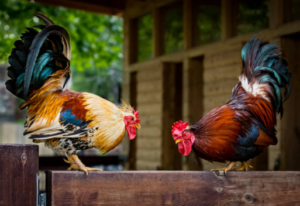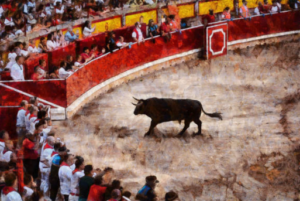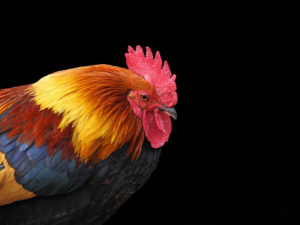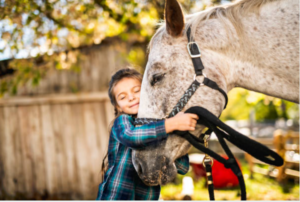Blood Sports

Beauty isn’t just skin deep. It extends to our actions and the way we treat the world around us. While beauty is often associated with makeup and skincare, it’s crucial to recognize that true beauty encompasses compassion, empathy, and ethical choices. In this blog, we delve into the dark side of entertainment and discuss the brutality of activities like bullfighting and cockfighting. By understanding these issues, we can take steps towards a more beautiful and compassionate world.
The Dark Side of Entertainment
Entertainment has always been a part of human culture, but the morality of certain practices evolves with time. While we understand that historical traditions can shape our cultural identity, it’s crucial to reevaluate activities that perpetuate harm, especially to animals.
Historical Context
Both bullfighting and cockfighting have deep historical roots. Bullfighting can be traced back to ancient Rome, and it became a symbol of Spanish culture during the 18th and 19th centuries. Similarly, cockfighting has a long history dating back thousands of years, with records of the sport in various cultures around the world.
It’s essential to recognize that just because an activity is steeped in history does not justify its continuation. Many practices that were considered acceptable in the past, such as human slavery, are now universally condemned. Our understanding of ethics and compassion evolves over time, and it’s only natural that we should question traditions that involve cruelty to animals.
Psychological Factors
Understanding the psychology behind supporting blood sports can shed light on why these practices persist in some regions. The appeal of these activities often lies in the adrenaline rush and the sense of competition, both of which can be found in other, more humane forms of entertainment.
Adrenaline Rush: Spectators at bullfights and cockfights are often drawn to the intense, high-stakes nature of the events. There’s an adrenaline rush associated with the unpredictability of the outcome, but this excitement comes at the expense of animal suffering.
Sense of Competition: In cockfighting, the competitiveness of breeding and training roosters plays a significant role in perpetuating the sport. Gamblers and breeders may find satisfaction in their birds’ victories, but it’s essential to question whether this satisfaction should come at the cost of animal lives.
Economic Dimensions
Economics plays a crucial role in the persistence of these activities. Blood sports can be financially lucrative for those involved. In the case of bullfighting, ticket sales, merchandise, and tourism revenue contribute to local economies in some regions, which can make it challenging to secure political support for a ban.
Similarly, cockfighting often involves gambling, with substantial sums of money changing hands. This economic aspect can create a vested interest in maintaining the status quo. However, the economic gains should never be prioritized over the welfare of animals.

The Ethical Concerns
Bullfighting and cockfighting raise significant ethical concerns, which go beyond the immediate cruelty inflicted on animals. These concerns revolve around the principles of compassion, sentience, and the moral implications of our actions.
Deliberate Cruelty and Suffering
At the core of the ethical concerns surrounding these practices is the undeniable cruelty and suffering experienced by animals. Both bullfighting and cockfighting involve the deliberate torment and killing of animals for human amusement.
- Bullfighting: In bullfights, the bull is subjected to extreme stress, pain, and fear. The animal is intentionally weakened and tormented through the use of capes, banderillas (barbed darts), and picas (sharp lances), which cause bleeding and injury. The bull’s prolonged suffering culminates in its death, often in a slow and painful manner.
- Cockfighting: In cockfights, two roosters are bred and trained to fight each other. These birds are typically armed with razor-sharp spurs, which they use to attack their opponent. The fights result in severe injuries or death for one or both of the birds. The suffering experienced by the roosters is prolonged, and it is a brutal ordeal for these animals.
Ethical Dilemmas
Bullfighting and cockfighting present ethical dilemmas that force us to confront fundamental questions about our values, our treatment of animals, and the sustainability of these practices.
- Exploitation for Amusement: The core dilemma is whether it is ethically justifiable to exploit animals for the sake of human entertainment. While culture and tradition may play a role in these practices, they do not excuse the cruelty involved.
- Sentience and Suffering: Acknowledging the sentience of animals is essential. Both bulls and roosters experience pain, fear, and distress, just as humans do. The ethical concern is whether we should intentionally subject animals to suffering for any form of amusement.
- Moral Progress: As a society, our moral values evolve over time. What was once considered acceptable may now be deemed inhumane. This raises the question of whether we should reevaluate traditions and practices that cause harm to animals and align them with modern ethical standards.
Moral Obligation
Ethical concerns related to bullfighting and cockfighting underscore the moral obligation we have towards animals. It is our responsibility to treat animals with kindness and compassion and to prevent unnecessary harm and suffering. These practices, by their nature, conflict with this moral obligation.
- Animal Welfare: The welfare of animals should be a primary concern in any activity that involves them. Ethical dilemmas arise when this welfare is ignored or disregarded for the sake of human entertainment.
- Prioritizing Entertainment Over Welfare: Another ethical concern is the prioritization of human entertainment over animal welfare. In both bullfighting and cockfighting, animals endure suffering and death for the sake of human amusement, raising serious moral questions about our priorities.

The Road to Change
Changing deeply entrenched traditions and practices like bullfighting and cockfighting requires a multi-faceted approach that involves individuals, communities, and governments. Here, we explore the various ways in which change can be achieved:
Raise Awareness
Raising awareness about the brutality of bullfighting and cockfighting is the first crucial step towards change. Education and information play a pivotal role in shifting public opinion.
- Educational Campaigns: Animal welfare organizations, activists, and concerned individuals can run educational campaigns to inform the public about the suffering and ethical concerns associated with these practices. These campaigns can include documentaries, public talks, and social media outreach.
- Youth Education: Introducing discussions about animal welfare and the cruelty of blood sports into school curricula can help instill ethical values in future generations. These discussions can empower students to become advocates for change.
Support Animal Welfare Organizations
Animal welfare organizations are at the forefront of efforts to protect animals from cruelty. By supporting these organizations, individuals can contribute to ongoing advocacy, awareness campaigns, and legal initiatives.
- Donations: Financial support through donations can help fund the work of animal welfare organizations. These funds are vital for organizing protests, running campaigns, and providing care for rescued animals.
- Volunteer Work: Volunteering for animal welfare organizations can be a hands-on way to contribute to the cause. Volunteers may engage in rescue operations, educational programs, and public awareness campaigns.
Contact Legislators
Political change is essential for addressing the ethical concerns related to bullfighting and cockfighting. Advocates and concerned citizens can reach out to legislators to express their concerns and advocate for stricter laws.
- Petitions and Lobbying: Organizing petitions and lobbying efforts can put pressure on legislators to reconsider the legality of blood sports. These actions help ensure that the concerns of the public are heard and considered in the political decision-making process.
- Support Legislative Initiatives: Individuals can actively support legislative initiatives and politicians who are committed to animal welfare. Voting for officials who prioritize the welfare of animals is a critical step in creating legal change.
Boycott and Protest
Consumer choices and public demonstrations can send powerful messages. By boycotting events and locations that promote or host bullfighting and cockfighting, and by participating in peaceful protests, individuals can express their opposition to these activities.
- Boycotting: Avoiding attendance at bullfighting events and cockfighting matches sends a clear message that cruelty to animals is not acceptable. This can also have economic consequences for those who profit from these practices.
- Protest Demonstrations: Peaceful protests and demonstrations draw attention to the issue and encourage public discussion. They can create public pressure for change and motivate authorities to reconsider the legality of blood sports.

Support Cruelty-Free Entertainment
Choosing entertainment options that do not involve cruelty to animals is a proactive step towards change. Individuals can advocate for and attend events that prioritize the welfare of animals while providing enjoyable entertainment.
- Cruelty-Free Alternatives: Communities can actively support and attend cultural events, sports, and entertainment that do not involve harm to animals. By participating in cruelty-free activities, individuals can show their preference for ethical forms of entertainment.
- Advocacy for Change: Advocacy groups and individuals can work with local communities to encourage the development and promotion of cruelty-free entertainment options. This can help shift the cultural narrative away from blood sports.
Educate the Youth
Education is a key tool for changing perspectives and building a more compassionate society. Collaboration with schools and youth organizations can help instill ethical values and awareness of animal welfare from a young age.
- School Programs: Collaborating with schools to introduce lessons or programs that educate students about animal welfare and the ethical concerns of bullfighting and cockfighting can contribute to a more compassionate future generation.
- Youth Organizations: Partnering with youth organizations can provide opportunities for young individuals to become advocates for change. These organizations can engage in awareness campaigns, public demonstrations, and educational outreach.
True beauty is not only about how we look but also about the choices we make and the values we uphold. Activities like bullfighting and cockfighting have no place in a beautiful world. They perpetuate cruelty and suffering for the sake of human entertainment, and it’s our moral duty to put an end to them. Let us strive for a more compassionate world where animals are protected, and their welfare is considered paramount. Through awareness, advocacy, and action, we can make this vision a reality.

